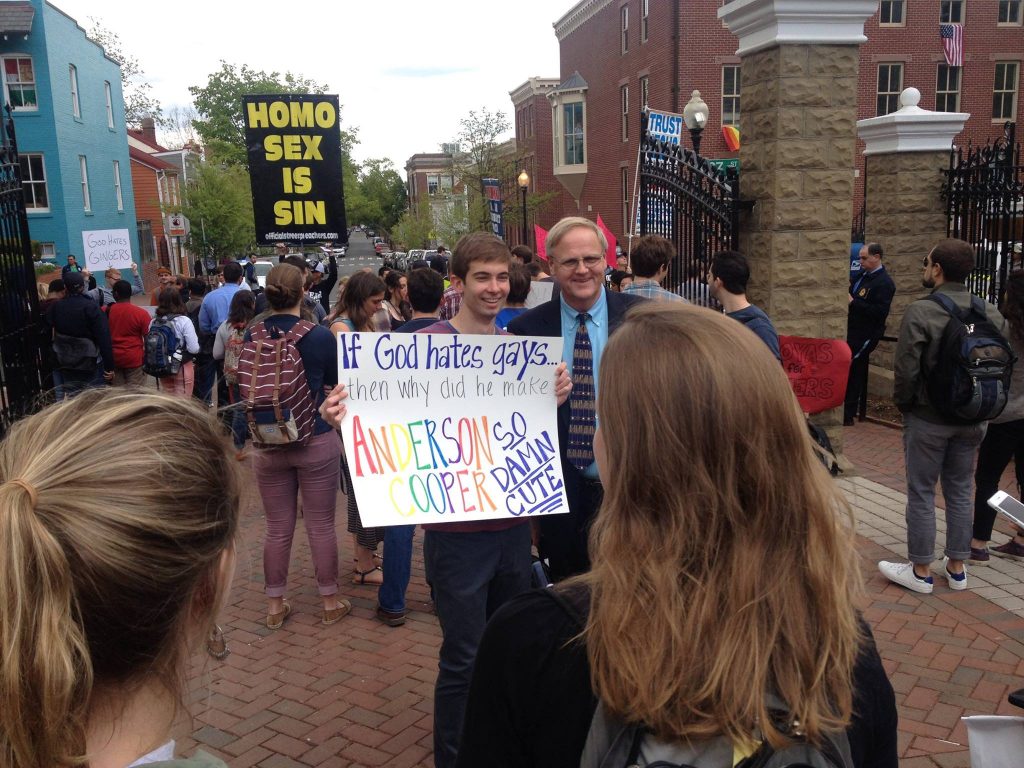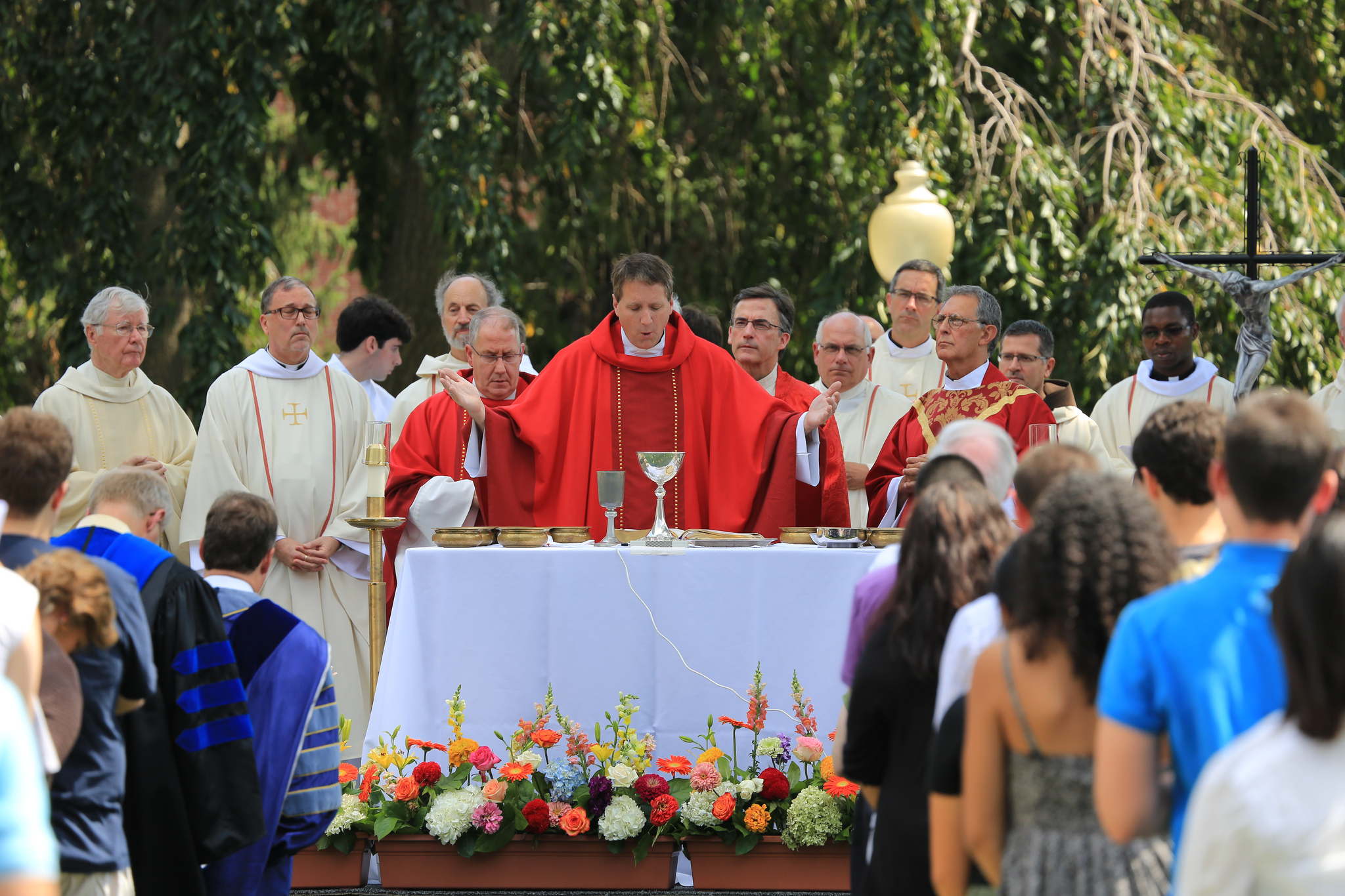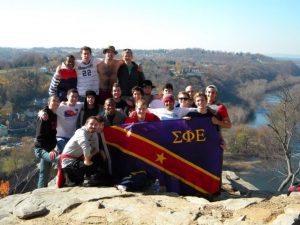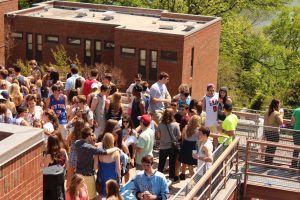On April 27th, 2015, a group of protestors from the Westboro Baptist Church (WBC) picketed outside of Georgetown’s front gates. The group, known for their hate speech on homosexuality and were stopping at Georgetown before marching through D.C. en route to the Supreme Court, were met by a crowded counter-protest of students screaming right back.
All the while about 100 yards away on the front lawn, students representing GU Pride, a group representing Georgetown’s LGBTQ and ally community, and other campus groups held a solidarity event featuring speeches from student leaders and campus chaplains. The event culminated in a prayer by Rev. Raymond Kemp and called for students to celebrate Georgetown’s diversity and to promote love and solidarity.

Todd Olson, vice president for student affairs and dean of students, poses with counter-protestors when Georgetown was picketed in April 2015 for its LGBTQ record. Photo: Daniel Varghese/Georgetown Voice
It was quite a day to be a Hoya.
The purpose of the initial WBC protest was to lambast the university for its inclusive attitude towards its diverse student body, particularly those who are gay. Upon first glance at the physical university itself though, it might seem like these protests must have been misdirected. Georgetown is a Catholic university and evidence of this is everywhere in the form of crucifixes. Whether on buildings, in classrooms, or on brochures, the prevailing faith tradition is indeed dominant.
That being said, Georgetown does not behave like any other American Catholic educational institution. While it is the oldest Catholic and Jesuit institution of higher education in the United States, it was also the first Catholic university to employ a full-time Rabbi and the first American university to employ a full-time Imam. Georgetown, as its founder, John Carroll, S.J., would have wanted it, remains a Catholic university open to and for people of all backgrounds dedicated to the principles of religious tolerance and understanding.
Today, this tradition of religious diversity and tolerance is evident in Georgetown’s Campus Ministry, which plays a very active role in student life. One of their main initiatives, the Chaplains-in-Residency program, places ministers in many different faith traditions in residence halls to provide guidance and support to students of any religious background.
The department also holds a weekend retreat called ESCAPE for first-year students meant to encourage the Ignatian values of “Contemplation in Action” and “Care for the Whole Person.” These retreats are held several times throughout the school year at the Calcagnini Contemplative Center, a mountain lodge-style estate that the university owns in in Bluemont, VA.
In addition to these programs, Campus Ministry boasts established ministries in Catholicism, Protestantism, Orthodoxy, Judaism, and Islam and support for Hindu, Buddhist, Mormon and atheist student groups.
These varied perspectives are similarly highlighted in a Georgetown student’s coursework in their two required theology courses. For the first of these, most students chose to take “Problem of God,” usually a survey of different religious philosophies on the question of God’s existence, or “Intro to Biblical Literature,” an academic study of the Bible. For the second, students can freely choose between classes on everything from “Intro to Buddhism,” “Religion and Science,” to “Jewish Sages and Sinners.”
This might be why groups like the WBC and various members of the Catholic Church insist that Georgetown’s Catholic Christian identity is merely a façade. In fact, in 2013 one Georgetown alumnus William Blatty (COL ’50), the author of The Exorcist, even submitted a 2,000-word petition to the Vatican asking for Georgetown to be stripped of its official status as a Catholic university.
As of yet, that hasn’t and probably won’t happen, though it’s clear that Georgetown is doing something that is upsetting many on the religious right. To them, the school’s general insistence on fostering religious contemplation and reflection at the individual level is an affront to Christian values.
But to Georgetown students, who get the unique opportunity and choice to explore whatever faith traditions speak to them, these notions feel like a perfect fit.





